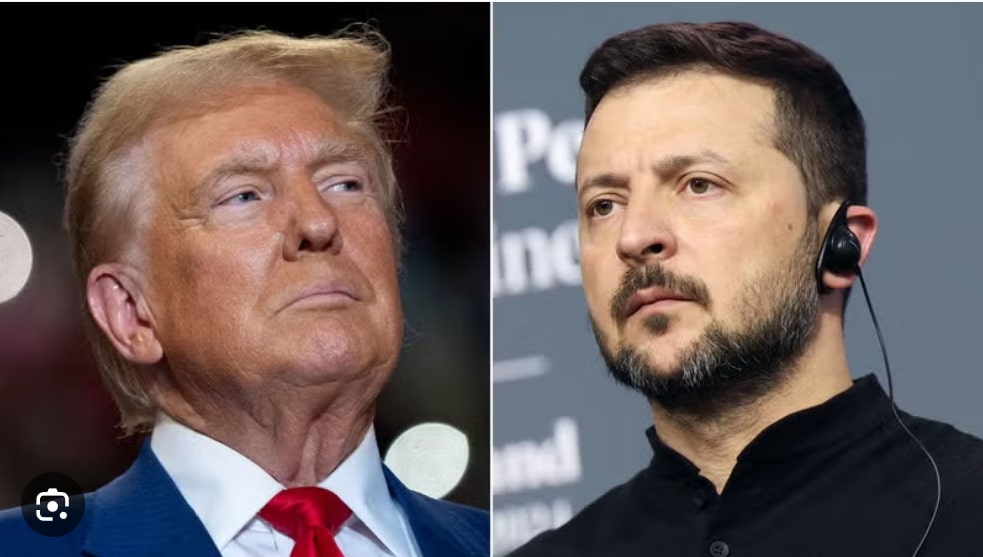In his nightly address on Wednesday, Ukrainian President Volodymyr Zelenskyy expressed hope for “constructive” cooperation with the United States. “We are scheduled to meet with General Kellogg tomorrow, and it is very important for us that the meeting—and our collaboration with America overall—be constructive,” Zelenskyy stated. “Together with America and Europe, peace can be more reliable, and this is our goal,” he added.
US-Ukraine Relations at a Crossroads
Tensions between the US and Ukraine have escalated following intensified criticism of Zelenskyy by former President Donald Trump. Trump labeled Zelenskyy a “dictator” and warned that Ukraine must “move fast” or risk collapse.
He also accused Zelenskyy—without evidence—of personally benefiting from ongoing US financial and military support. These remarks cast serious doubt on continued US aid and marked his most explicit threat to end the war on terms favorable to Moscow.
Trump’s heated post on Truth Social Wednesday came after Zelenskyy accused the former US president of being “trapped” in a Russian “disinformation bubble.” Zelenskyy argued that Trump was parroting “a lot of Russian propaganda” and criticized Washington for engaging in direct talks with Moscow in Riyadh earlier this week. He also disputed Trump’s claim that most of Ukraine’s support comes from the US.
Vice President JD Vance Warns Zelenskyy
US Vice President JD Vance warned Zelenskyy against “bad-mouthing” Trump, suggesting that criticizing the US president would not serve Ukraine’s interests. At a press conference, Zelenskyy pushed back against Trump’s assertion that Ukraine was responsible for Russia’s 2022 invasion, a claim aligning with Kremlin narratives.
Trump, in turn, expressed disappointment over Zelenskyy’s complaints about being excluded from US-Russia negotiations and pressured him to hold elections, a key demand from Moscow.
Former Vice President Mike Pence publicly challenged Trump’s stance, stating: “Mr. President, Ukraine did not ‘start’ this war… The road to peace must be built on truth.” Speaking to business leaders in Miami, Trump repeated his attacks on Zelenskyy, arguing that the Ukrainian president “could have attended the talks in Saudi Arabia if he wanted to.” However, Zelenskyy denied ever being invited.
Putin and European Leaders Respond
Russian President Vladimir Putin stated that Ukraine would not be left out of future peace talks and dismissed claims that Moscow had rejected negotiations with Europe or Kyiv. Regarding Trump, Putin suggested that the former US president was finally receiving “objective information” about the war, leading to a shift in his stance. He also expressed willingness to meet with Trump and praised the results of the recent US-Russia summit in Riyadh.
Meanwhile, European leaders reaffirmed their support for Ukraine. UK Prime Minister Keir Starmer reiterated his backing for “Ukraine’s democratically elected leader” during a call with Zelenskyy. German Chancellor Olaf Scholz condemned attempts to undermine Zelenskyy’s legitimacy, calling them “wrong and dangerous.” EU foreign policy chief Kaja Kallas emphasized that any peace deal must include Ukraine and Europe.
Diplomatic and Military Developments
Starmer and French President Emmanuel Macron are set to visit Washington next week. Macron will meet with Trump at the White House, while Starmer will engage in talks on ending the war in Ukraine. US National Security Advisor Mike Waltz confirmed that multiple meetings are planned.
Sweden and Poland announced plans to strengthen political and defense cooperation in response to rising security threats across Europe. Both nations pledged to bolster Ukraine’s defenses and improve security in the Baltic region, particularly in critical infrastructure.
Denmark’s Prime Minister Mette Frederiksen declared that her country requires “massive rearmament” to deter potential conflict, announcing a $7 billion defense investment over the next two years. This move, which raises Denmark’s military spending to 3% of GDP (up from 2.4% in 2024), follows pressure from the Trump administration over Greenland and concerns about reduced US support for Europe and Ukraine.
Sanctions and International Criticism
Europe’s leading human rights official criticized US Vice President JD Vance’s remarks on European democracy, calling his views “very problematic.” Michael O’Flaherty, Commissioner for Human Rights at the Council of Europe, challenged Vance’s claim that Europe had abandoned its core values.
Meanwhile, the EU announced its 16th round of sanctions against Russia, which includes a ban on Russian aluminum imports and additional measures targeting vessels smuggling Russian oil below Western-imposed price caps.
EU officials highlighted the importance of these sanctions, especially amid fears that Trump may attempt to lift US restrictions on Russia as part of a broader peace negotiation.








